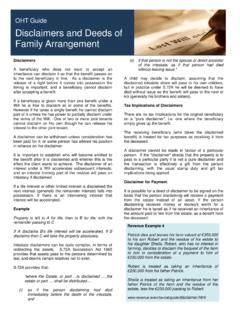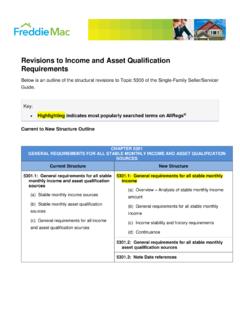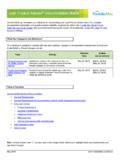Transcription of Employed v Self Employed FOH - O'Hanlon Tax
1 The issue of whether an individual is considered an employee or a self Employed individual is very topical, especially in relation to medical locums, as Revenue are focusing on the point when carrying out audits. If a locum is re-categorised as an employee this could have significant tax and legal consequences. Employment Law If a person is characterised as an employee for tax purposes it may be assumed that he is an employee for legal purposes, so that he can claim the benefit of employee protection legislation, redundancy and unfair dismissal protection, maternity rights etc. Revenue have expressed a view that the tax classification is not definitive in terms of the legal employment position but it is not clear what view bodies such as the Employment Appeals Tribunal would take.
2 Taxation Issues A subcontractor is responsible for paying his own tax, so the employer does not need to worry about PAYE, PRSI or health/income levy. In addition there is no employer s PRSI, which is a tax saving of By contrast if an individual is an employee the employer has primary responsibility for ensuring that tax is paid on the salary, and he must pay employer s PRSI of in addition to the employee s PRSI. It costs more in tax to hire an employee than to retain a sub-contractor. As the employer has primary responsibility for paying PAYE, to Revenue he will be the first port of call if tax is not paid in full. If a locum is self Employed , and has paid tax over to the Revenue Commissioners, and the Revenue re-categorise the relationship as employment they may seek to collect employer s PRSI from the employer.
3 However if the locum has not been remitting tax, then the Revenue will not have received any of the PAYE, PRSI, and health levy they are due from the employee, or the employer s PRSI, and will seek to collect all of this from the employer. If Revenue feel that the tax returns have been incorrectly filed, or that tax has not been fully paid, they may also seek interest and penalties. Criteria on Whether an Individual is an Employee In an article in Tax Briefing 43 Revenue indicated that while all of the following factors may not apply, an individual would normally be an employee if some of the factors below apply, if he:- Is under the control of another person who directs how, when and where work is to be carried out. Supplies labour only. Receives a fixed hourly/weekly/monthly wage. Cannot sub-contract the work. Does not supply materials, or equipment other than the small tools of the trade.
4 Is not exposed to personal financial risk on the work. Does not assume any responsibility for investment and business management. Does not have a chance to profit from sound management in arranging the work. Works set hours or a given level of hours per week/month. Works for one person or for one business. Receives expense payments to cover subsistence and/or travel expenses. Is entitled to extra pay or time off for overtime. Tax Briefing 43 The Employment Status Group was set up because of a growing concern that there may be increasing numbers of individuals categorised as self Employed when employee status would be more appropriate. The findings of the Group were included as an Article in Tax Briefing 43 and then published as a Code of Practice (see ).
5 The Group indicated that the overriding consideration or test will always be whether the person performing the work does so as a person in business on their own account. The question is whether the person is a free agent with an economic independence of the person engaging the service? In a recent article (Tax Briefing 82) the Revenue indicated that the Code will be applied and each case will be decided on its own facts. The Code of Practice suggests that where there are difficulties in deciding the appropriate status of an individual or groups of individuals, the following organisations can provide assistance, the Local Revenue Office, the Local Social Welfare Office, or the Scope Section in the Department of Social and Family Affairs.
6 Employed v self Employed The Denny Case In Henry Denny & Sons (Irl) Limited v Minister for Social Welfare (1997) a supermarket demonstrator who was paid a fee in respect of each demonstration was deemed to be an employee notwithstanding statements to the contrary in her contract. Each demonstrator submitted an invoice and payment was made each fortnight without deduction of tax or PRSI. The contract had a number of statements to the effect that she was not an employee:- You are deemed to be an independent contractor , It shall be your duty to pay and discharge such taxes and charges as may be payable out of such fees to the Revenue Commissioners or otherwise , It is agreed that the provisions of the Unfair Dismissals Act 1977 shall not apply etc , You will not be an employee of this company , You will be responsible for your own tax affairs.
7 The judge felt the statements in the contract should be disregarded, as they were only the opinion of the contracting parties. The Barry Case The case of Minister for Agriculture & Food v. Barry & Ors (7th July 2008) contains an analysis of the tests for whether a person is an employee. It dealt with Temporary Veterinary Inspectors (TVI), long believed to have been self Employed contractors. Many of the TVIs themselves had their own practices from which they were based. The issue of classification arose when the work which they were engaged to carry out ceased following the closure of the Galtee Meats Plant in Mitchelstown. The judge found that the TVIs were engaged as independent contractors, not employees. They were also in business on their own account, and they could and did continue in private practice and undertook temporary work for the Department.
8 The remuneration was paid on an hourly rate agreed by the Department and their union. Mid Doc Case The Out of Hours Service is based on a partnership initiative between the HSE and General Practitioners in a specific region. In the Mid-Doc service the HSE provided the funds, administration, transport and premises for the locums. The GPs formed a Co-Op. Funds were held in a Co-op account to pay the locums. These funds came from grants from the HSE, not from the GPs themselves. The Revenue argued that the GPs were employing the locums and the GPs took a different view, as they had little or no contact with the locums. Revenue raised assessments on Mid-Doc on the basis that it was employing the locums, and the GPs appealed. Both sides presented a set of facts to the Appeal Commissioners. The taxpayer presented circa 50 statements of fact, all of which were rejected.
9 All of the circa 30 statements of fact presented by the Revenue were accepted by the Appeal Commissioners, who found that the locums were employees of the Mid-Doc GPs. Many of the Mid-Doc locums came from South Africa where they had established practices, and they were using their holidays to come to Ireland and work as locums for a few weeks each year. A business was set up in South Africa to bring South African doctors to Ireland to work in the Out of Hours services. Some of the key facts were: The locums paid their own flights and their own insurance. The locums worked in pairs and they could substitute for each other without approval from a GP. Non paired locums could also be substituted as long as they were fully qualified and insured. There was no obligation on locums to accept all the hours offered, so by increasing or decreasing the hours worked they could increase profits.
10 When the case was running some commentators suggested that as the GPs had no contact with the locums it would be more logical to select the HSE as the locums employer as it provided the administration, the grants, and the transport etc. for the Out of Hours Service. The Appeal Commissioners found for Revenue. The GPs appealed but the case was settled out of Court before the Appeal was heard. Current Revenue Position Revenue have issued a letter to the IMO in regard to the tax treatment of medical locums. In this letter Revenue state that in general medical locums are employees and should be subject to PAYE. Revenue have stated that in exceptional cases they will review matters on a case-by-case basis where terms of engagement are different to the norm. This is a significant change on Revenue's part as they will now only review exceptional situations on a case-by-case basis.






